|
|
|
Sort Order |
|
|
|
Items / Page
|
|
|
|
|
|
|
| Srl | Item |
| 1 |
ID:
101518
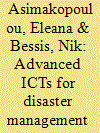

|
|
|
|
|
| Publication |
Hershey, Information Science Reference, 2010.
|
| Description |
xxiv, 344p.
|
| Standard Number |
9781615209873, hbk
|
|
|
|
|
|
|
|
|
|
|
|
Copies: C:1/I:0,R:0,Q:0
Circulation
| Accession# | Call# | Current Location | Status | Policy | Location |
| 055585 | 384.5/ASI 055585 | Main | On Shelf | General | |
|
|
|
|
| 2 |
ID:
103106
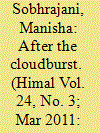

|
|
|
| 3 |
ID:
060714


|
|
|
| 4 |
ID:
098496


|
|
|
| 5 |
ID:
090406
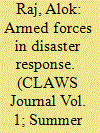

|
|
|
|
|
| Publication |
2008.
|
| Summary/Abstract |
The Indian armed forces have rendered disaster aid to a number of countries in the past, adding yet another dimention to the international disaster response. A number of countries look up to India on many a front, especially when struck by a major calamity. With growing regional and global cooperation in disaster reduction and response, the Indian armed forces can play a vital role befitting India's emerging status of regional power.
|
|
|
|
|
|
|
|
|
|
|
|
|
|
|
|
| 6 |
ID:
123704
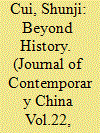

|
|
|
|
|
| Publication |
2013.
|
| Summary/Abstract |
This article takes the proposition that cooperation in the area of non-traditional security (NTS) can provide the essential window of opportunity for Northeast Asians to move beyond history. To demonstrate, it explores the development of NTS cooperation in Northeast Asia, paying particular attention to Sino-Japanese cooperation in the environmental and disaster areas. It then examines the relationship between NTS cooperation and the construction of a regional international society in Northeast Asia. It argues that the importance of NTS cooperation is twofold. First, in a region where historical animosities remain high, NTS issues can avoid sensitive areas and find common ground for cooperation that traditional security approaches would be unable to envisage. Second, NTS cooperation has turned people-to-people relations in a more prominent and conciliatory direction, and enhanced human security consideration, thus taking things further than the indirect consequences of functionalism.
|
|
|
|
|
|
|
|
|
|
|
|
|
|
|
|
| 7 |
ID:
101771
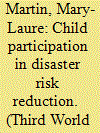

|
|
|
|
|
| Publication |
2010.
|
| Summary/Abstract |
Children are particularly vulnerable to the effects of natural disasters. This article aims to gain a deeper understanding of the specific effects of natural disasters on children and how they could better be involved in the disaster risk reduction (DRR) process. The article begins with a review of the literature published on the Child-led Disaster Risk Reduction (CLDRR) approach and describes the key issues. Then it identifies the effects of floods on children in Bangladesh and analyses the traditional coping mechanisms developed by communities, highlighting where they could be improved. Finally, it analyses how DRR stakeholders involve children in the DRR process and identifies the opportunities and gaps for the mainstreaming of a CLDRR approach in Bangladesh. This should contribute to a better understanding of how key DRR stakeholders can protect children during natural disasters. Encouraging the building of long-term, child-sensitive DRR strategies is an essential part of this process.
|
|
|
|
|
|
|
|
|
|
|
|
|
|
|
|
| 8 |
ID:
156519
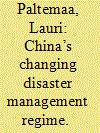

|
|
|
|
|
| Summary/Abstract |
This article analyses China’s disaster management regime at the local level. The article outlines historic disaster management regimes from the pre-imperial era to the present and ends with an analysis of the ongoing campaign for ‘comprehensive disaster relief model communities’. As argued in the article, throughout history Chinese disaster management has been characterized by attempts to combine strong state leadership with active grass-roots participation in disaster prevention and relief work, and different historical circumstances have translated into different kinds of disaster governance regimes with strengths and weaknesses. The current situation is no exception. The current model community drive led by the party-state aims to establish local professional or semi-professional disaster management organizations in every urban community, but leaves the role of civic organizations vaguely defined. While the state’s commitment to local-level disaster management has its strengths, the current ambiguous conceptualization of the role of civil society actors leaves resources untapped.
|
|
|
|
|
|
|
|
|
|
|
|
|
|
|
|
| 9 |
ID:
132953
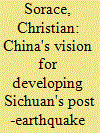

|
|
|
|
|
| Publication |
2014.
|
| Summary/Abstract |
In the aftermath of the 2008 Wenchuan earthquake, government officials, scholars and outside observers eagerly hoped that the emergency relief and reconstruction process would bring about the emergence of civil society and increase grassroots democratic participation. Contrary to this optimistic assessment, this article contends that the local state used the opportunity of the disaster as an experimental laboratory to implement an array of already existing national development plans. The urgency with which the reconstruction was to be completed and the opportunities to meet national development targets as well as access reconstruction funds were too tempting to resist. However, the ham-fisted Leninist implementation style met with local resistance and has contributed to a significant deterioration in local state-society relations. The fact that many local residents continue to question why, despite the huge resources invested by the state in the reconstruction project, they have yet to see any improvement in their economic and overall living conditions points to a deficit of local participation and a breakdown in political communication and trust. By focusing on the different political economies of disaster reconstruction, this article attempts to illuminate the regime's vision for developing the countryside, rural politics, and state-society relations in China more broadly. Unless the state is able to incorporate local needs into its development plans, it will not win the trust and support of local residents, regardless of the amount of money it invests or the benevolence of its intentions.
|
|
|
|
|
|
|
|
|
|
|
|
|
|
|
|
| 10 |
ID:
188066


|
|
|
|
|
| Summary/Abstract |
The increasing impacts of climate change have created a global humanitarian crisis. Growing populations, unstable political structures, and competition over scarce resources are generating unprecedented levels of insecurity. Capitalising on these complex situations, terrorist organisations are using the environment as a weapon of war, exploiting the strains and grievances exacerbated by climate change to increase support, aid recruitment, and incite violence. Often neglected within contemporary analyses is the potential impact of anthropogenic climate change on left-wing terrorist organisations. Consequently, the research presented in this paper takes an interdisciplinary approach, combining terrorism studies with disaster management to examine a specific type of security crisis that exists in this overlapping relationship between climate change and left-wing conflict. Three regional case studies of terrorist groups and activity are examined in detail—the Revolutionary Armed Forces of Colombia, the Shining Path in Peru, and Naxalites in India. The article reveals the complex issues that underlie climate disasters, focusing on the impact hazards such as deforestation, rising sea levels, extreme weather, glacial retreat, drought, famine, water scarcity, and migration have on left-wing terrorist recruitment and activity.
|
|
|
|
|
|
|
|
|
|
|
|
|
|
|
|
| 11 |
ID:
129741
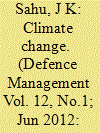

|
|
|
| 12 |
ID:
161237
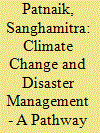

|
|
|
|
|
| Summary/Abstract |
While Climate change is perceived as global problem India is no exception to it. Nearly 700 million people in rural India are directly depending for their livelihood on climate-sensitive sectors such as agriculture, forests, fisheries and natural resources. Climate change has a strong impact on all the natural ecosystems, health and socio-economic systems, as reported by India to the United Nations Framework Convention on Climate Change (UNFCCC).
|
|
|
|
|
|
|
|
|
|
|
|
|
|
|
|
| 13 |
ID:
061445
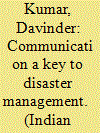

|
|
|
|
|
| Publication |
Jan-Mar 2005.
|
|
|
|
|
|
|
|
|
|
|
|
|
|
|
|
| 14 |
ID:
145384
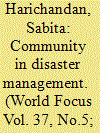

|
|
|
|
|
| Summary/Abstract |
Major disasters overload the capability of first responders like community. Countries must prepare for and adapt to the impacts of disaster. Linking short-term disaster preparedness to long-term strategies for adaptation to profound impact would serve the purpose better. Addressing to the increased vulnerability of people of the community and making them empowered, prepared and vigilant may prove to be the panaceas.
|
|
|
|
|
|
|
|
|
|
|
|
|
|
|
|
| 15 |
ID:
145396


|
|
|
|
|
| Summary/Abstract |
Disasters destroy lives and livelihoods around the world. Thus science and technology is already helping to save lives and livelihoods in some instances. For disaster risk reduction, science is considered in its widest sense to include the natural, environmental, social, economic, health and engineering sciences.
|
|
|
|
|
|
|
|
|
|
|
|
|
|
|
|
| 16 |
ID:
145397
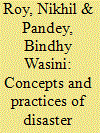

|
|
|
|
|
| Summary/Abstract |
From the above discussions it is clear that even though hazards are unavoidable, disasters are preventable. This has created the discipline and the practise of Disaster Management, wherein, the risk of disaster and the vulnerability of people to disaster is reduced. An example of how disaster management reduce the loss to life and property is the case of the coastal areas of Andhra Pradesh and Orissa in India.
|
|
|
|
|
|
|
|
|
|
|
|
|
|
|
|
| 17 |
ID:
130442
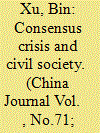

|
|
|
|
|
| Publication |
2014.
|
| Summary/Abstract |
Consensus crisis and civil society: the Sichuan earthquake response and state-society relations
A consensus crisis is characterized by challenges to the state's managerial capacity, a critical need for civil society's services, a general agreement on priorities and goals, and the state's efforts to construct a morally respectable image. These features amplify the structural conditions favorable for relatively amicable state-society interactions. Existing studies of social response to the 2008 Sichuan earthquake focus on state-society relations, but neglect the role of situations. I argue that the earthquake is an example of a consensus crisis, which provided civil associations with a situational opening of political opportunity.
|
|
|
|
|
|
|
|
|
|
|
|
|
|
|
|
| 18 |
ID:
075675
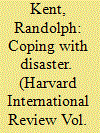

|
|
|
| 19 |
ID:
132495
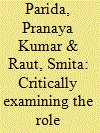

|
|
|
|
|
| Publication |
2014.
|
| Summary/Abstract |
Each day, natural disasters such as ?oods, earthquakes and hurricanes/ cyclones threaten human life and cause severe environmental losses around the world. During the last decade, disasters have affected the lives and assets of almost 2.4 billion people across the world (OCHO, 2010). In India alone since the year 2000, an average 65 million people have been affected by disasters every year. Of this, 8.45 million have been children under the age of ?ve and 3.25 million are pregnant and lactating mothers (UNICEF). Such
humanitarian crises often set back the developmental gains of lesser developed regions by several" decades. Not only do disasters lead to the loss of life and property, but "the immediate a?ermath is a complex situation complicated by issues of logistics, search and rescue, relief distribution, limited accessibility to some of the affected areas, the threat of secondary disasters, the mostly well-intentioned interests of diverse stakeholder groups (which many a times are external to the context of thedisaster), the in?ow of aid material and grants, political interest, media interest and often limited administration capacity. Government is responsible for administrative arrangements dealing with disasters.- Effective policies play a vital role in mitigating the impact of disasters and reducing likely losses of life and property ( Erramilli, 2008) . The disaster management, which is not being treated as a sector by itself, is
undergoing major changes, especially at the institutional and policy levels, which are prompted by various. macro-level factors ( Wagle and Warghade, 2006). Effective coordination among various stakeholders, specifically the Government, the international community and nongovernmental organizations (NGOS) in the aftermath of a disaster is critical to, among other things, a minimization in disaster response time, the proper allocation of resources and the avoidance of duplication of response efforts; Moreover, as economic growth and sustainable development are essential to successful disaster preparedness and mitigation efforts, effective coordination has the potential to strengthen the link between emergency response, preparedness and long-term development strategies.
|
|
|
|
|
|
|
|
|
|
|
|
|
|
|
|
| 20 |
ID:
132489
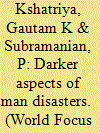

|
|
|
|
|
| Publication |
2014.
|
| Summary/Abstract |
Disaster is a term one would rather be not associated with because of the negative vibes that it sends out. The ways and means to overcome the negative-thoughts that are brought on in the wake of disaster assume a lot of importance. The consequences of disaster have such far reaching and destructive effects that we become helpless individuals running helter skelter to seek protection and also recover from the shock of disaster.
|
|
|
|
|
|
|
|
|
|
|
|
|
|
|
|
|
|
|
|
|